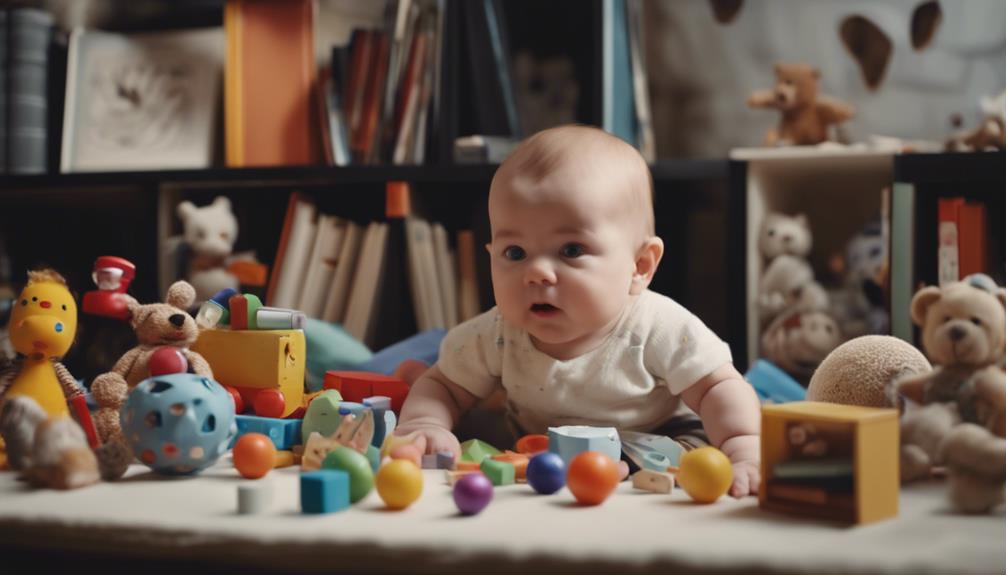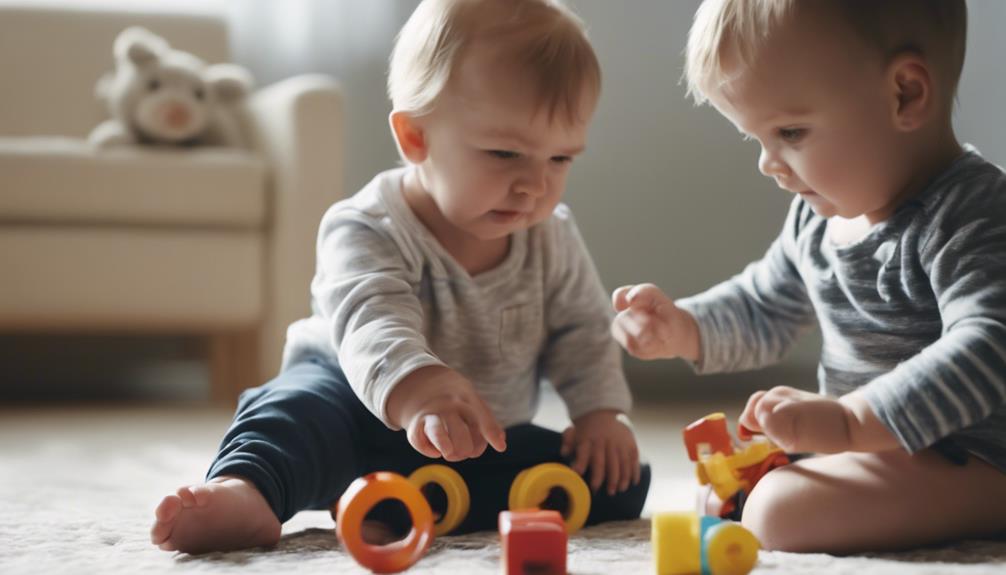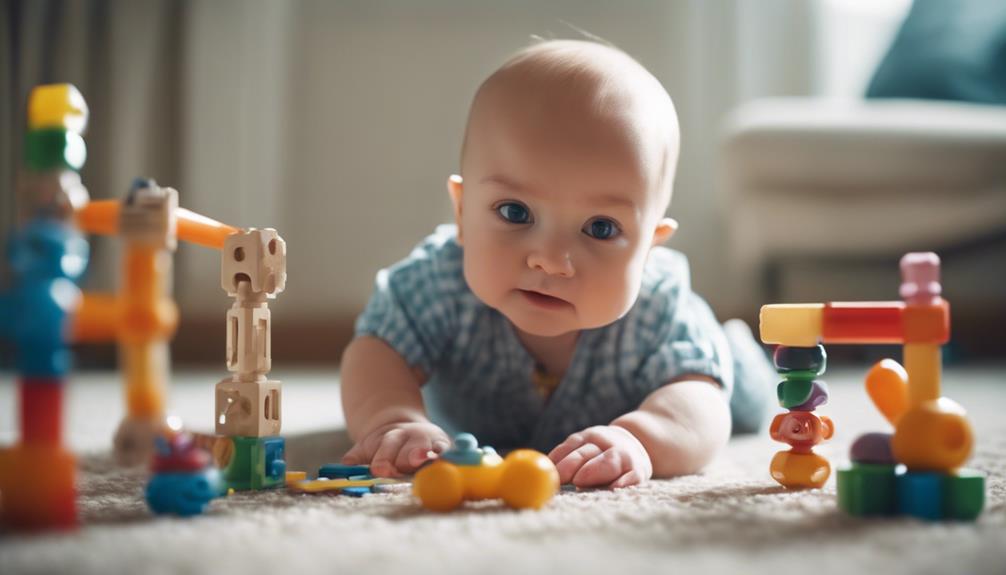If your baby displays signs of advanced development, strive for exceptional alertness, advanced motor skills, and early language proficiency. Superior memory recall, curiosity, and rapid learning are signs of accelerated progress. Sensory sensitivity, social and emotional advancement, and a talent for problem-solving indicate advanced skills. Moreover, a preference for interacting with older companions and a vivid, imaginative mind may signal advanced development. These characteristics collectively suggest your baby has the potential to exceed typical milestones. Aim for a comprehensive understanding of your baby’s growth.
Key Takeaways
- Exceptional alertness, quick responses, and heightened awareness indicate advanced cognitive development.
- Early mastery of motor skills like crawling and balance suggests advanced physical development.
- Advanced language proficiency, extensive vocabulary, and complex sentence structures demonstrate cognitive advancement.
- Preference for older companions, engaging in complex pretend play, and storytelling show social and emotional development.
- Strong problem-solving skills, innovative thinking, and unique cognitive strengths hint at advanced development.
Exceptional Alertness
If you notice your baby displaying exceptional alertness, it could be a sign of advanced development for their age. Gifted children often exhibit a high level of alertness, showcasing heightened awareness of their surroundings and quick responses to stimuli. These advanced babies may demonstrate a remarkable focus and responsiveness, indicating a keen ability to process information efficiently. Their vigilance, attentiveness, and engagement with the environment set them apart from their peers. Through early recognition of patterns, sounds, and visual cues, these babies display advanced cognitive abilities that distinguish them as gifted individuals.
Parents may observe their baby's heightened alertness through sustained eye contact, quick reactions, and an overall sense of heightened awareness. This early display of exceptional alertness can be an early indicator of the baby's cognitive potential and advanced development.
Engaging with your baby and providing a stimulating environment can further nurture their abilities and encourage continued growth in their alertness and cognitive skills.
Advanced Motor Skills

Babies with advanced motor skills often display early crawling abilities, sometimes as soon as 4.9 months.
Additionally, their fine motor coordination can be remarkably precise, with some babies holding crayons adaptively by 7.7 months.
These skills indicate a higher level of physical development and coordination, potentially reflecting advanced cognitive and physical capabilities in your little one.
Early Crawling Abilities
With advanced motor skills, your baby might impressively start crawling earlier than expected, possibly before the typical age range of 7-10 months. Early crawling abilities in babies can be a significant indicator of advanced developmental milestones at an early age.
Babies who exhibit advanced crawling skills often demonstrate remarkable coordination and balance, efficiently moving on their hands and knees. This early ability to crawl can suggest exceptional muscle strength and coordination in infants, highlighting their physical prowess.
Moreover, advanced crawlers may progress to walking at a faster pace, showcasing their overall physical development. By exploring their environment actively through crawling, babies with advanced motor skills display a heightened sense of curiosity and engagement with their surroundings.
Encouraging this early crawling development can support your baby's physical growth and further enhance their motor skills. Keep an eye out for these signs of early crawling abilities as they can indicate advanced motor skill development in your little one.
Precise Fine Motor Coordination
Advanced babies with exceptional motor skills often demonstrate precise fine motor coordination, showcasing their ability to manipulate small objects with accuracy and dexterity. This advanced level of fine motor coordination can be observed in various tasks that require intricate movements and control.
Here are some key indicators that your baby may have advanced motor skills:
- Holding objects with precision, like using a pincer grasp to pick up small items.
- Performing tasks that demand accuracy, such as stacking blocks in a stable structure.
- Displaying superior hand-eye coordination through activities like fitting shapes into corresponding holes.
These abilities not only highlight your baby's advanced fine motor coordination but also suggest early development in this area. From scribbling with a crayon to buttoning clothes, observing these skills in your baby can be a sign of their advanced motor capabilities at a young age.
Early Language Proficiency

Demonstrating early language proficiency can include speaking clear words or phrases before the age of one. Babies showing advanced language skills often exhibit a remarkable grasp of vocabulary and may construct sentences beyond their years. Some early signs of heightened language proficiency in infants involve engaging in meaningful conversations or even storytelling at a young age. These babies may not only communicate effectively with adults but also demonstrate an understanding of abstract concepts. Additionally, some advanced babies may display multilingual abilities, effortlessly picking up new languages. Below is a table summarizing the characteristics of early language proficiency in advanced babies:
| Early Language Proficiency in Advanced Babies |
|---|
| Clear and coherent speech |
| Extensive vocabulary |
| Complex sentence structures |
| Meaningful conversations |
| Multilingual abilities |
| Understanding of abstract concepts |
Observing these signs in your baby could indicate a remarkable aptitude for language development at an early age.
Superior Memory Recall

Gifted babies often possess exceptional memory skills, allowing them to retain information with remarkable clarity. Their rapid information retention enables them to easily remember faces, events, and details from a very young age, showcasing their advanced cognitive recall abilities.
These superior memory capabilities can be observed through their accurate recollection of words, names, and sequences, setting them apart from their peers with regard to accelerated learning and problem-solving skills.
Exceptional Memory Skills
With superior memory recall, your baby may surprise you with their ability to retain and retrieve information beyond their age group. Gifted babies often exhibit exceptional memory skills, showcasing an advanced capacity to remember and process information.
Here are some signs indicating exceptional memory skills in your baby:
- Rapid Information Retention: Gifted babies may quickly grasp and recall new information, demonstrating a heightened ability to learn and retain knowledge.
- Detailed Memory: Your baby might surprise you by remembering intricate details from past experiences or events, showcasing a remarkable level of memory accuracy.
- Advanced Cognitive Abilities: Displaying superior memory skills can be an early indicator of your baby's advanced cognitive development, setting them apart from their peers with regards to information processing and retrieval.
If your baby consistently exhibits these signs, it could be a strong indication of their exceptional memory skills and advanced cognitive abilities.
Rapid Information Retention
Your baby's rapid information retention, a sign of paramount memory recall, can be a remarkable indicator of their advanced cognitive abilities. Gifted babies demonstrate an exceptional capacity to absorb and store details, often surprising caregivers with their ability to recall specific words, actions, or experiences from a very young age.
This paramount memory retention not only allows them to remember past events but also aids in their learning of new skills and concepts.
Memory recall plays a significant role in cognitive development, serving as a key indicator of intelligence in babies. Advanced babies can retain information quickly and effectively, showcasing their ability to process and store vast amounts of data.
Their remarkable memory skills enable them to excel in various areas, from language acquisition to problem-solving tasks. By harnessing their rapid information retention capabilities, these babies can navigate complex learning environments with ease, setting a strong foundation for future intellectual growth.
Advanced Cognitive Recall
Demonstrate your baby's advanced cognitive recall by observing their ability to remember specific details from past experiences with remarkable accuracy. Gifted children with advanced cognitive recall exhibit exceptional memory retention, surpassing typical developmental milestones in this area.
Here are some key indicators of superior memory recall in babies:
- Recalling specific events, people, or objects even after extended periods, showcasing their exceptional memory abilities.
- Remembering words, sounds, or patterns with remarkable accuracy, highlighting their strong cognitive recall skills.
- Recognizing familiar faces, objects, or surroundings consistently, indicating a high level of memory retention.
These signs of advanced cognitive recall in babies can be early manifestations of exceptional intelligence. Observing your child's ability to remember and recall information efficiently can provide insights into their cognitive strengths and potential for intellectual development.
Curious and Fast Learner

Advanced babies who are curious and fast learners typically exhibit a high level of enthusiasm to explore and a quick grasp of new information and skills. Gifted infants often display a strong desire for knowledge, constantly seeking out new experiences and information. Their quick learning abilities allow them to absorb concepts and skills at an accelerated pace compared to their peers.
These babies show a natural inclination towards exploration and experimentation, demonstrating a keen interest to engage with tasks beyond their age group. Their remarkable memory retention further enhances their learning capabilities, enabling them to efficiently absorb and recall information. This combination of curiosity and fast learning sets them apart and indicates advanced cognitive abilities from an early age.
Encouraging this natural curiosity and providing opportunities for continued learning and growth can help nurture their potential and support their development as they continue to progress and thrive.
Strong Problem-Solver

If your baby is an advanced problem-solver, you might notice quick puzzle-solving skills emerging. They tend to approach challenges with innovative methods, showcasing a natural inclination towards critical thinking.
Their ability to think outside the box and analyze problems from different perspectives sets them apart in problem-solving situations.
Quick Puzzle-Solving Skills
Babies with strong problem-solving skills can effortlessly tackle complex puzzles at a young age. Gifted infants exhibit a remarkable ability to solve age-appropriate puzzles with speed and accuracy, showcasing their advanced problem-solving skills.
Here are some key indicators of quick puzzle-solving skills in advanced babies:
- Preference for Challenges: Gifted babies may show a distinct preference for challenging puzzles, seeking out complex problems to solve.
- Enjoyment in Complexity: These infants often find joy in figuring out intricate puzzles, displaying a natural inclination towards problem-solving.
- Sign of Cognitive Development: Advanced problem-solving abilities in babies can serve as a significant sign of high intelligence and cognitive development, highlighting their exceptional aptitude in this area.
Encouraging these babies with stimulating activities like puzzles can further nurture and enhance their problem-solving abilities, fostering their intellectual growth and development.
Innovative Problem-Solving Methods
Gifted infants often exhibit exceptional problem-solving skills by employing innovative methods to tackle challenges beyond their age group. These advanced problem-solving methods can manifest in various ways, such as quickly figuring out complex puzzles or tasks that typically challenge older children. Intelligent babies demonstrate a unique ability to approach problems in creative and unconventional ways, setting them apart from their peers in regards to cognitive development.
Encouraging your baby with challenges and puzzles can play a significant role in nurturing and enhancing their natural problem-solving abilities. By providing the right support and positive reinforcement during problem-solving tasks, you can help stimulate their cognitive development and foster a mindset geared towards innovative problem-solving methods.
These early experiences can lay a strong foundation for your baby's future learning and critical thinking skills, preparing them for success as they continue to grow and develop.
Natural Critical Thinking
Demonstrating a remarkable aptitude for critical thinking, advanced infants exhibit a natural knack for solving complex problems with innovative strategies. Their problem-solving skills and cognitive abilities set them apart from their peers, showcasing a unique set of qualities that hint at their advanced development.
Here are three key characteristics that highlight their natural critical thinking prowess:
- Creative Solutions: Gifted babies often surprise observers with their ability to find creative solutions to challenges, displaying a level of ingenuity beyond their years.
- Logical Reasoning: These infants show a deep understanding of cause and effect relationships, approaching problems with a logical mindset that aids them in reaching effective solutions.
- Interest in Mental Challenges: Gifted babies thrive on mental challenges, displaying a keen interest in puzzles and complex tasks that stimulate their critical thinking skills, further enhancing their cognitive abilities.
Sensory Sensitivity

Exhibiting heightened awareness of their environment, advanced babies with sensory sensitivity may demonstrate a preference for complex toys offering various sensory experiences. These gifted infants often show a keen interest in sounds, textures, and lights, signaling a need for increased stimulation and engagement.
Their high energy levels drive them to seek out new sensory input, satisfying their curiosity and thirst for knowledge. Gifted babies' strong memory retention abilities are closely linked to their capacity to process and remember intricate sensory information in great detail. This sensory sensitivity contributes immensely to their intense focus and concentration on tasks that provide sensory stimulation, fostering their cognitive development.
Social and Emotional Advancement

Early on, you may notice certain signs indicating your baby's advanced social and emotional development. Gifted babies often exhibit behaviors that set them apart regarding these areas.
Here are a few indicators of highly gifted babies regarding their social and emotional advancement:
- Comfort with Older Children or Adults: Gifted babies may feel at ease interacting with individuals older than themselves, displaying a level of maturity in social situations.
- Heightened Emotional Awareness: These babies might demonstrate a keen sensitivity to the emotions of others, showing a deep understanding and empathy towards different feelings.
- Early Empathy and Concern for Others: Gifted babies can show an early inclination towards caring for others' emotional well-being, displaying empathy and compassion from a young age.
Observing these traits in your baby could be a sign of advanced social and emotional development, highlighting their potential for building strong relationships and positively influencing those around them.
Preference for Older Companions

When gifted babies display a preference for older companions, it can indicate an advanced inclination towards seeking intellectually stimulating interactions. These babies may gravitate towards older children or adults rather than same-age peers as they're drawn to more mentally engaging conversations and activities.
Enjoying the company of older individuals not only showcases their advanced social and emotional development but also exposes them to more complex ideas at an early age. This preference for older companions can foster accelerated learning and provide these babies with intellectual challenges that align with their advanced cognitive abilities.
It signifies a desire for deeper interactions and a thirst for knowledge beyond what's typically expected at their age. Observing this behavior in your baby may be a sign of their exceptional intellectual potential and their readiness for engaging with more mature individuals in ways that stimulate their advanced cognitive development.
Creative Imagination

Babies who are gifted often showcase an exceptional creative imagination, manifesting in elaborate scenarios and stories during playtime. This ability sets them apart from their peers and can be a strong indicator of advanced development.
Gifted babies with creative imaginations may exhibit a deep understanding and creativity in their imaginative worlds, engaging in complex pretend play that surpasses typical expectations. Additionally, these infants demonstrate a keen ability to think beyond the obvious, showcasing innovative solutions to problems that highlight their exceptional cognitive skills.
Highly imaginative babies often show a preference for creative activities such as drawing, storytelling, or building imaginative structures, further emphasizing their advanced capabilities in the realm of creativity.
- Gifted babies with creative imaginations often exhibit a natural inclination towards artistic expression and storytelling from a very young age.
- Advanced infants may engage in complex pretend play, demonstrating a deep understanding and creativity in their imaginative worlds.
- Gifted babies showcase an exceptional creative imagination by inventing elaborate scenarios and stories during playtime.
Frequently Asked Questions
How Do I Know if My Baby Is Advanced for Her Age?
You can tell if your baby is advanced for their age by noticing early achievement of milestones, speaking in sentences ahead of schedule, showing exceptional problem-solving skills, displaying intense curiosity, and preferring complex toys.
How Do I Know if My Child Is Advanced for His Age?
You can tell if your child is advanced for his age by observing early mastery of skills, exceptional focus, and a strong desire for challenging activities. High curiosity, energy levels, and memory retention are also key indicators.
How to Identify a High IQ Baby?
To identify a high IQ baby, observe for early problem-solving skills, intense focus, and rapid learning abilities. Watch for signs like exceptional language skills, curiosity, and preference for complex toys. These traits may indicate advanced intelligence.
How Do I Know if My Baby Is Progressing?
You can tell your baby is progressing by observing milestones like sitting up, saying first words, crawling upstairs, walking upstairs, forming sentences, developing vocabulary, social smiles, vocalizing sounds, adaptive crayon holding, and skipping with alternating feet.
Conclusion
To sum up, identifying the signs of advanced development in your baby can offer valuable insights into their unique abilities and potential. By observing their alertness, motor skills, language proficiency, memory recall, curiosity, sensory sensitivity, social and emotional advancement, preference for older companions, and creative imagination, you can better understand and support their growth.
Stay tuned for more tips and guidance on nurturing your child's exceptional talents and abilities.










